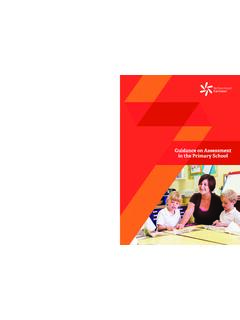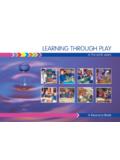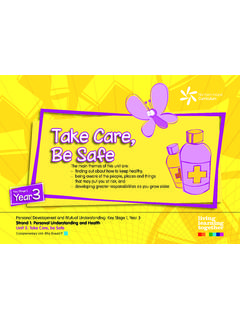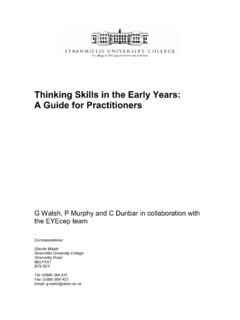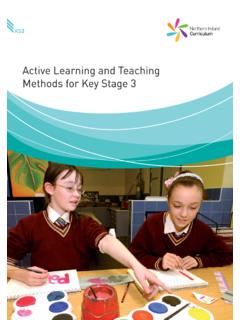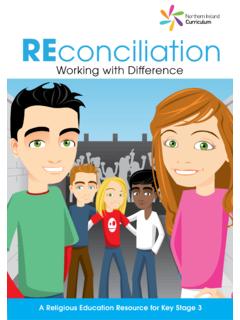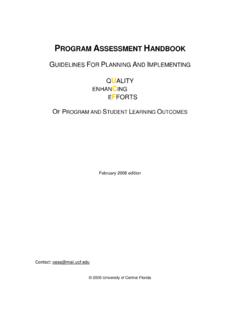Transcription of (PDF) The Northern Ireland Curriculum: Primary
1 The Northern IrelandCurriculum PrimaryThe Northern Ireland curriculum Introduction The revised Northern Ireland curriculum Stages of the Primary curriculum Structure of the Primary curriculum 2 Providing Equality of Opportunity and Access for All Whole curriculum Aim and Objectives Whole curriculum Skills and Capabilities Approaches to Learning and Teaching Planning for Coherence and Progression assessment for Learning Foundation Stage Language and Literacy Mathematics and Numeracy The Arts The World Around Us Personal Development and Mutual Understanding Physical Development and Movement Key Stages 1&2 Language and Literacy Mathematics and Numeracy The Arts The World Around Us Personal Development and Mutual Understanding Physical Education 99 The Northern Ireland curriculum CCEA Publication 2007 CCEA wishes to thank the schools who willingly co-operatedin the production of the photographs used in this Northern Ireland curriculum OF THE Primary CURRICULUMThe Primary phase comprises:The Foundation Stage: Years 1 and 2 Key Stage 1: Years 3 and 4 Key Stage 2: Years 5, 6 and OF THE Primary CURRICULUMThe curriculum for the three stages is set out in six Areas of Learning.
2 Although the Areas of Learning are set out separately teachers should, where appropriate, integrate learning across the six areas to make relevant connections for children. Teachers have considerable flexibility to select from within the learning areas those aspects they consider appropriate to the ability and interests of their pupils. The Areas are:1 Language and Literacy (including Talking and Listening, Reading and Writing; schools are also encouraged to teach additional languages);2 Mathematics and Numeracy (focusing on the development of mathematical concepts and numeracy across the curriculum );3 The Arts (including Art and Design, Drama and Music);4 The World Around Us (focusing on the development of knowledge, skills and understanding in Geography, History and Science and Technology);5 Personal Development and Mutual Understanding (focusing on emotional development, social skills, learning to learn, health, relationships and sexuality education and mutual understanding in the local and global community);6 Physical Education (focusing on the development of knowledge, skills and understanding through play and a range of physical activities).
3 REVISED Northern Ireland CURRICULUMThis document sets out the requirements of the revised Northern Ireland curriculum (hereafter referred to as the Northern Ireland curriculum ) and is the starting point for planning a school curriculum that meets the needs of individual children. The revisions to the curriculum aim to retain the best of current practice while seeking to give greater emphasis to important elements, such as children s Personal Development and Mutual Understanding and the explicit development of Thinking Skills and Personal Capabilities. The Northern Ireland curriculum sets out the minimum requirement that should be taught at each key stage. Within these requirements, schools have a responsibility to provide a broad and balanced curriculum for all children and schools should aim to give every child the opportunity to experience success in learning and to achieve as high a standard as possible. Teachers, however, have considerable flexibility to make decisions about how best to interpret and combine the requirements so as to prepare young people for a rapidly changing access statement outlines how teachers can modify the Northern Ireland curriculum as necessary to provide all children with relevant and challenging have a responsibility to provide a broad and balanced curriculum for all children and schools should aim to give every pupil the opportunity to experience success in learning and to achieve as high a standard as possible.
4 The Statutory curriculum is the starting point for planning a school curriculum that meets the needs of individual pupils. The Northern Ireland curriculum sets out the minimum requirement that should be taught at each key stage. The Thinking Skills and Personal Capabilities Framework allows teachers to teach the knowledge, skills and understanding in ways that suit individual pupils will be aware that pupils have different experiences, interests and strengths, which will influence the way in which they learn. In planning curriculum and assessment activities, teachers should be aware of the requirements of the equal opportunities legislation and the Special Educational Needs and Disability Order (SENDO) and should have high expectations for all pupils, including pupils with special educational needs, pupils with disabilities, pupils from all social and cultural backgrounds, pupils of different ethnic groups including travellers and those from diverse linguistic to learning and teaching should provide suitably challenging opportunities for all pupils to take part in lessons fully and effectively and should allow all pupils to achieve.
5 For pupils with special educational needs teaching should take account of the type and extent of the difficulty experienced by the pupil. For pupils whose attainments fall significantly below the levels expected at a particular key stage, degrees of differentiation of tasks and materials appropriate to the age and requirements of the pupil will be necessary. For pupils whose attainments significantly exceed the expected levels of attainment during a particular key stage, teachers will need to plan suitably challenging work by extending the breadth and depth of study across Areas of planning to meet the needs of all pupils, teachers may need to: use teaching approaches appropriate to different learning styles; use a range of organisational approaches, such as setting, grouping or individual work, to ensure that individual needs are properly addressed; vary content and presentation so that it matches the learning needs of particular pupils; use a range of activities and contexts for work and allow a variety of interpretations and outcomes; allocate sufficient time for children to complete tasks; use accessible texts and materials that suit children s age and level of learning; plan work which builds on interests and cultural diversity.
6 Plan the pace of work so that all children will have the opportunity to learn effectively and achieve success; plan challenging work for those whose ability and understanding are in advance of their peer group; provide support by using ICT, video or audio materials, dictionaries and other suitable aids; enable the fullest possible participation of pupils with disabilities, including those with medical needs, to access physical activities and extra-curricular activities with appropriate support, aids or adaptations. Many pupils with disabilities can learn alongside their peers with little need for additional resources beyond the aids or equipment they use as part of their daily EQUALITY OF OPPORTUNITY AND ACCESS FOR ALLThe Northern Ireland curriculum to SocietyContributors to the Economy and EnvironmentThroughout the Primary stages teachers should help children to: develop self-confidence, self-esteem and self-discipline; understand their own and others feelings and emotions; develop the ability to talk about how they feel; develop their motivation to learn and their individual creative potential; listen to and interact positively with others; explore and understand how others live;(Personal and MutualUnderstanding) have an understanding of healthy eating and the importance of exercise; develop positive attitudes towards an active and healthy lifestyle, relationships, personal growth and change.
7 Become aware of key issues which affect their physical, social and mental well-being and that of others; develop an awareness of their own personal safety;(Personal Health) develop an awareness of right and wrong; develop an awareness of how their actions can affect others; understand that values, choices and decisions should be informed by a sense of fairness; take responsibility for their actions; develop tolerance and mutual respect for others;(Moral Character) develop a sense of awe and wonder about the world around them.(Spiritual Understanding)Throughout the Primary stagesteachers should help children to: become aware of some of their rights and responsibilities; become aware of some of the issues and problems in society; contribute to creating a better world for those around them;(Citizenship) develop an awareness and respect for:- the different lifestyles of others;- similarities and differences in families and people in the wider community; understand some of their own and others cultural traditions; be aware of how we rely on each other;(Cultural Understanding) be aware of, and use, information available to us through all sorts of media; become aware of the potential impact of media in influencing our personal views, choices and decisions;(Media Awareness) become aware of the imbalances in the world around us, at both a local and a global level; become aware of the potential impact of developments upon the lives of others.
8 (Ethical Awareness)Throughout the Primary stages teachers should help children to: develop literacy, numeracy and ICT skills; develop their aptitudes, abilities and creativity; be willing to expand their learning and performance throughout their lives; work independently and as a member of a team; develop perseverance, initiative and flexibility; be willing to take calculated risks when appropriate; use critical and creative thinking to solve problems and make decisions; identify the main reasons why people set up their own business.(Employability) learn to manage their money and build up savings; interpret information in order to make informed choices as consumers; develop an understanding of the importance of using resources carefully in the classroom; develop an awareness of some environmental issues;(Economic Awareness) appreciate the environment and their role in maintaining and improving it; understand how actions can affect the environment.(Education for Sustainable Development) curriculum AIM AND OBJECTIVESAimThe Northern Ireland curriculum aims to empower young people to develop their potential and to make informed and responsible choices and decisions throughout their learning opportunities provided through the Northern Ireland curriculum should help young people to develop curriculum SKILLS AND CAPABILITIESAt the heart of the curriculum lies an explicit emphasis on the development of skills and capabilities for lifelong learning and for operating effectively in society.
9 Through opportunities to engage in active learning contexts across all areas of the curriculum , children should progressively develop:Cross-Curricular Skills: Communication Using Mathematics Using Information and Communications TechnologyThinking Skills and Personal Capabilities: Thinking, Problem-Solving and Decision-Making Self Management Working with Others Managing Information Being CreativeFurther guidance will be made available for schools before reporting of these skills becomes statutory in 2009 across the curriculumCommunication is central to the whole curriculum . Children should be able to communicate in order to express themselves socially, emotionally and physically, to develop as individuals, engage with others and contribute as members of society. Children should be given opportunities to engage with and demonstrate the skill of communication and to transfer their knowledge about communication concepts and skills to real-life meaningful contexts across the modes of communication include talking and listening, reading and writing.
10 However, effective communication also includes non-verbal modes of communication, wider literacy and the use of multimedia and ICT technologies which may combine different modes. Children are therefore encouraged to become effective communicators by using a range of techniques, forms and media to convey information and ideas creatively and requirements for Communication are set out the curriculum , at a level appropriate to their ability, pupils should be enabled to develop skills in:TALKING AND LISTENINGP upils should be enabled to: listen to and take part in discussions, explanations, role-plays and presentations; contribute comments, ask questions and respond to others points of view; communicate information, ideas, opinions, feelings and imaginings, using an expanding vocabulary; structure their talk and speak clearly so that ideas can be understood by others; adapt ways of speaking to audience and situation; use non-verbal methods to express ideas and engage with the Northern Ireland curriculum should be enabled to: read a range of texts* for information, ideas and enjoyment.

